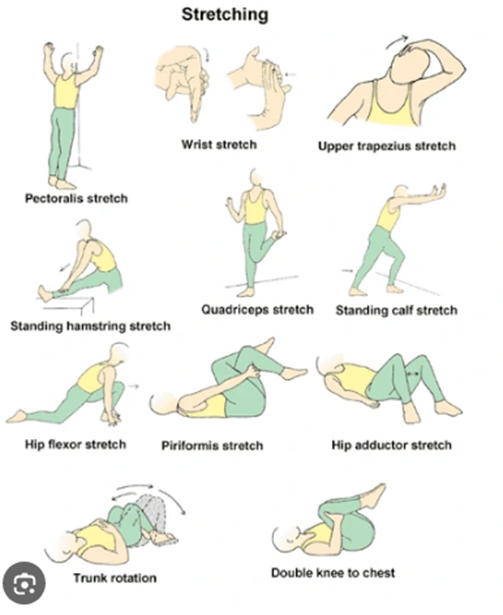The nurse is creating an education plan for a client who has a recent diagnosis of Multiple Sclerosis (MS). Which of the following interventions should the nurse include in the client's plan?
Provide total assistance with all ADLs
Order a low-residue diet
Encourage client to void every hour
Instruct the client on daily muscle stretching
The Correct Answer is D
Choice A reason: Providing total assistance with all ADLs is not an intervention that should be included in the client's plan. ADLs are activities of daily living, such as bathing, dressing, eating, and toileting. Providing total assistance with all ADLs can reduce the client's independence and self-esteem, and increase their dependence and learned helplessness. The nurse should encourage and assist the client to perform as much as they can by themselves and provide partial or intermittent assistance only when needed.
Choice B reason: Ordering a low-residue diet is not an intervention that should be included in the client's plan. A low-residue diet is a type of diet that limits foods that are high in fiber or indigestible material, such as whole grains, nuts, seeds, fruits, and vegetables. A low-residue diet may be recommended for clients who have inflammatory bowel disease (IBD), diverticulitis, or bowel obstruction, as it can reduce bowel frequency and irritation. However, it is not indicated for clients who have MS, unless they have other comorbidities that require it. A balanced diet that includes adequate fiber, fluids, and nutrients is more beneficial for clients who have MS.
Choice C reason: Encouraging the client to void every hour is not an intervention that should be included in the client's plan. Voiding every hour can be inconvenient and impractical for the client, and may not address their bladder problems effectively. MS can cause bladder dysfunction, such as urinary urgency, frequency, incontinence, or retention, due to nerve damage that affects bladder control. The nurse should assess the type and severity of the bladder dysfunction, and provide appropriate interventions, such as medication, catheterization, pelvic floor exercises, or bladder training.
Choice D reason: Instructing the client on daily muscle stretching is an intervention that should be included in the client's plan. Muscle stretching is a type of exercise that involves extending or elongating a muscle or group of muscles to their full length. Muscle stretching can help prevent or relieve muscle spasticity, stiffness, pain, or contractures that may occur in clients who have MS. The nurse should teach the client how to perform muscle stretching safely and correctly, and encourage them to do it daily or as prescribed.

Nursing Test Bank
Naxlex Comprehensive Predictor Exams
Related Questions
Correct Answer is ["A","B","C","D"]
Explanation
Choice A reason: Nurses performing duties outside of the nurses' typical job description is a component that should include nurses. In a disaster situation, nurses may have to assume roles and responsibilities that are beyond their usual scope of practice, such as triage, first aid, or mass casualty management. Nurses should be trained and prepared to perform these duties safely and effectively.
Choice B reason: A plan for comprehensive practice drills is a component that should include nurses. Practice drills are essential for testing and improving the disaster plan, as well as enhancing the skills and confidence of the staff. Nurses should participate in regular and realistic drills that simulate different types of disasters and scenarios.
Choice C reason: Identification of resources to meet anticipated needs for food, water, and supplies is a component that should include nurses. In a disaster situation, the demand for resources may exceed the supply, and the availability of resources may be disrupted or limited. Nurses should be involved in identifying and prioritizing the essential resources that are needed to provide care and support to the clients and staff.
Choice D reason: An internal and external communication plan is a component that should include nurses. In a disaster situation, communication is vital for coordinating actions, sharing information, and providing updates. Nurses should be aware of the communication channels and protocols that are used within and outside the hospital, such as radios, phones, or social media.
Choice E reason: Discharge all surgical clients who are one day or more post-op is not a component that should include nurses. This is not a realistic or appropriate strategy for reducing the hospital's occupancy or workload in a disaster situation. Discharging surgical clients who are still recovering may compromise their health outcomes and increase their risk of complications or readmission.
Correct Answer is C
Explanation
Choice A reason: A skilled nursing facility is a type of long-term care facility that provides 24-hour nursing care and supervision for residents who need assistance with activities of daily living, such as bathing, dressing, eating, and toileting. A skilled nursing facility may not be suitable for a young client with multiple sclerosis who has the potential for improvement and recovery.
Choice B reason: Home care services are a type of community-based care that provides medical and personal care to clients in their own homes. Home care services may include nursing, physical therapy, occupational therapy, speech therapy, social work, or home health aide services. Home care services may be appropriate for a client with multiple sclerosis who has mild to moderate symptoms and a supportive family or caregiver.
Choice C reason: A rehabilitation facility is a type of short-term care facility that provides intensive physical and occupational therapy to clients who have functional impairments due to injury, illness, or surgery. A rehabilitation facility may also provide medical, nursing, and psychological care to clients who need them. A rehabilitation facility may be suitable for a client with multiple sclerosis who has significant muscle weakness and needs to regain strength, mobility, and independence.
Choice D reason: A sub-acute care facility is a type of transitional care facility that provides medical and nursing care to clients who are stable but need complex monitoring or treatment that cannot be provided at home or in a skilled nursing facility. A sub-acute care facility may also provide rehabilitation services to clients who need them. A sub-acute care facility may not be appropriate for a young client with multiple sclerosis who has the potential for improvement and recovery.

Whether you are a student looking to ace your exams or a practicing nurse seeking to enhance your expertise , our nursing education contents will empower you with the confidence and competence to make a difference in the lives of patients and become a respected leader in the healthcare field.
Visit Naxlex, invest in your future and unlock endless possibilities with our unparalleled nursing education contents today
Report Wrong Answer on the Current Question
Do you disagree with the answer? If yes, what is your expected answer? Explain.
Kindly be descriptive with the issue you are facing.
